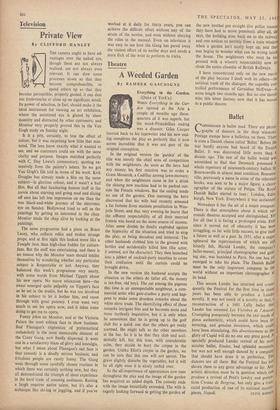Television
Private View
By CLIFFORD HANLEY
THE camera ought to have ad- vantages over the naked eye, though these are not always realised, are not always even relevant. It can slow some processes down so that they become comprehensible, or speed others up so that they become perceptible; properly guided, it can shut out irrelevancies or close up on significant detail. Its power of selection, in fact, should make it the ideal instrument for viewing an art exhibition, where the untutored eye is glazed by sheer quantity and distracted by other customers; and Monitor very properly proved this in the Van Gogh study on Sunday night.
It is a pity, certainly, to lose the effect of colour, but it was surprising how little that mat- tered. The lens knew exactly what it wanted to see, and we customers could see with the same clarity and purpose. Images matched perfectly with C. Day Lewis's commentary, quoting ex- tensively from the painter's letters. So we got Van Gogh's life told in terms of his work. Kirk Douglas has already made a film on the same subject—in glorious colour, and it wasn't a bad film. But all that fascinating human stuff in the movie about starving and going mad and slicing off ears has left less impression on me than the wee black-and-white journey of the electronic eye on Sunday. Hollywood tried to sell us the paintings by getting us interested in the chap. Monitor made the chap alive by looking at the paintings.
The same programme had a piece on Bruce Lacey, who collects relics and makes strange props, and at first sight this looked more like a Tonight item than high-class fodder for culture- fans. But the stuff was entertaining, and there is no reason why the Monitor team should inhibit themselves by wondering whether any particular subject is Respectable or not. Anyway, they balanced this week's programme very neatly, with some words from Michael Tippett about his new opera. No suave relaxation here—the sweat emerged quite palpably on Tippett's face as he sat in the studio, but he was too involved in his subject to let it bother him, and came through with great potency. I even want very much to see his opera now, and it takes some doing to get me to opera.
Funny jokes on Monitor, and at the Victoria Palace the most solemn face in show business. Bud Flanagan's expression of preternatural melancholy is the most memorable element of the Crazy Gang, now finally dispersed. It went out in a satisfactory blaze of glory and nostalgia, but what I mean about Flanagan's sad face is that comedy is a deadly serious business, and frivolous people are rarely funny. The Gang went through some carefully chosen routines in which there was certainly nothing new, but they all demonstrated the triumph of sheer experience in the bard trade of amusing audiences. Raising a laugh requires native talent, but it's also a technique like ski-ing or juggling, and if you've worked at it daily for thirty years, you can achieve the difficult effect without any of the strain of the novice, and even without obeying the rules in the manual. Even on television it was easy to see how the Gang has pared away the violent effort of its earlier days and needs a mere flick of the wrist to perform its tricks.






































 Previous page
Previous page